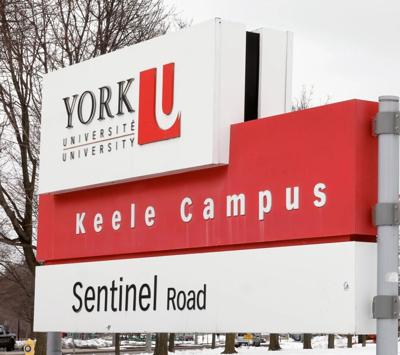One of Canada’s largest universities is suspending new admissions to 18 programs this fall in the face of declining enrolment and a multimillion-dollar deficit.Â
As of September, York University will be putting a pause on incoming students in mostly language and humanity majors, from Spanish and Italian degrees to Indigenous, Jewish, gender and women’s studies — a move some faculty say goes against York’s mission and values and threatens the future of courses that offer wider perspectives on the world.Â
York spokesperson Yanni Dagonas confirmed Tuesday that the school was taking action to “achieve financial sustainability in light of unexpected policy directions at the provincial and federal levels affecting higher education,” and that the identified programs “have shown low enrolment.”
“The temporary suspension of admission to a program will allow faculty colleagues the needed time to review and enhance program offerings and develop plans to offer the program sustainably,” said Dagonas, who would not provide data on the number of affected students.
Post-secondary institutions across Ontario have been making cuts to programs and staff as they navigate a financial crisis brought on by a combination of years of stagnant provincial funding, a tuition freeze, and a federal cap on international students that has led to a drop in enrolment and revenue.
York, which faces current , has Ìý(²¹²Ô»å s), down 5.8 per cent from 2018-19. First-year enrolment of international students was down 16 per cent last September compared to fall 2023.Â
Late on Friday, J.J. McMurtry, dean of York’s Faculty of Liberal Arts and Professional Studies, alerted department leaders of the decision to not admit incoming students this fall in the following majors:Â German, Italian, Portuguese and Luso-Brazilian, and Spanish languages; classics and classical studies; East Asian studies; Hellenic studies; Indigenous studies; Jewish studies; religious studies; gender and women’s studies; and sexuality studies.
That news came a day after staff were told new admissions would be placed on hold for two science undergraduate programs: environmental biology and biomedical physics. And on Tuesday, four additional majors, at York’s bilingual Glendon campus, joined the list: sociology; global history and justice; English; and Spanish and Latin American cultures and societies.Â
Dagonas said York’s action does not mean all courses within these programs are suspended. According to McMurtry’s letter, fall 2025 applicants will be given an offer to take an alternative, and current students can be assured that “they can complete their degree on track with minimal disruption.”Â
Elicia Clements, an associate professor and chair of York’s humanities department, said the move “will severely cut the diversity and range of degree offerings for students who are interested in the study of culture more broadly.
“Degrees in each of these programs prepare students with essential tools for the working world that are sought after by employers, such as critical and writing skills, problem solving and independent thinking, all with a mind to civic duty and social justice,” she said, adding that what she finds especially disconcerting is the suspension of the . “The closure of this program would significantly undermine the principles espoused in York’s commitment to decolonizing, equity, diversity and inclusion, a promise that is, according to , ‘embedded in (York’s) mission, vision and values.’”
Dagonas explained York took the measures in part to address a , which among its findings concluded the university “continued to offer many academic programs with low demand and enrolment, despite continued financial deficits.”
Dean McMurtry’s note to faculty defined reduced student interest and demand as a program where (undergraduate Fiscal Full-Time Equivalent numbers) are 50 or fewer and enrolment trends have been stable or declining.
“If you cut a program just because its number of majors doesn’t meet some kind of an accounting threshold, you’re being very short-sighted about the academic perspectives that are offered by the university as a whole,” said Ellie Perkins, a professor and president of York University Faculty Association, which represents more than 1,700 members.
These are courses that students in other disciplines, from engineering to business, can and do take as electives to better understand equity perspectives, she added.
Both Perkins and Clements fear that having a year with no additional enrolment could eventually lead to full program shutdowns.Â
To address its current deficit, York approved  that includes re-envisioning its academic structures and improving student retention as well as deferring renovations and cutting discretionary operating expenses. It also introduced a voluntary exit program for staff.Â
 documents note that in addition to a decrease in enrolment, last winter’s prolonged strike by contract professors and teaching assistants hurt the bottom line. York attributed a $50 million gap in tuition revenue to the labour disruption.Â
Last December, the university announced it was suspending its Master of Leadership & Community Engagement, a part-time professional degree that was set to take in its next round of students this summer.Â
“I am pretty embarrassed to be a graduate student and a former teaching assistant at York University as the ‘administration’ guts dozens of programs,” Ph.D. candidate . “Absolutely unbelievable ... shame ... shame ... shame.”


























To join the conversation set a first and last name in your user profile.
Sign in or register for free to join the Conversation